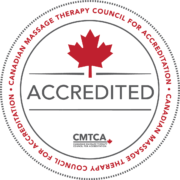Accreditation for Massage Therapy Schools: Everything you wanted to know
Admissions staff at Vicars School of Massage Therapy are used to fielding inquiries about tuition, class sizes, or financial aid. But lately, admissions advisor Rhonda Watson has also been answering a lot of questions about another topic: CTMCA accreditation.
“More people have been asking whether we are an accredited school, and we love it,” Rhonda says. “It tells us that they have done their homework and understand that a diploma from an accredited school like Vicars is the way to make sure that they will find the job they want and be prepared for success as soon as they start work.”
Since it’s such a popular topic, we decided to put together a blog post answering some of the biggest questions that we get on the subject.
Is Vicars School of Massage Therapy accredited by the CMTCA?
Yes! Vicars earned full accreditation status in 2022. So far, we are the only private massage therapy school in Alberta to have been granted this distinction.
What Is CMTCA accreditation?
Program accreditation through the Canadian Massage Therapy Council for Accreditation (CMTCA) is a way for massage therapy programs to demonstrate that they meet Canada’s national program standards.
The CMTCA is a completely independent organization whose job it is to review massage therapy programs in Canada. This assessment is based on a long list of criteria, including the quality of the curriculum, student experience, facilities, and overall organization of the school. Their process includes both an in-depth review of the school’s documentation, and a multi-day site visit at each campus.
By granting full accreditation, the CMTCA is announcing that the school:
- Meets the curriculum standards of the regulated provinces (more about that below);
- Awards diplomas only to massage therapists who have proven themselves skilled, knowledgeable, and effective; and
- Delivers what it promises: qualified instructors, relevant content, and a culture of continuous improvement.
Why does accreditation matter?
Accreditation matters because the quality of your massage therapy career will depend on the quality of your education. And the best way to judge the quality of a school is by making sure that it meets Canada’s national standards.
Not all massage therapy programs are created equal. This is especially true in a province like Alberta, where the massage therapy profession isn’t regulated by the government, and neither is the content or quality of massage therapy education. In provinces where massage therapy is a regulated health profession, schools have to follow the national curriculum and delivery standards, accreditation is mandatory, and the professional regulatory groups (called “professional colleges”) only recognize programs that meet these standards.
Alberta is a little bit like the “Wild West” in comparison. So it’s incredibly important that people who want to become massage therapists do their research and make sure that they’re choosing a quality school.
At Vicars, we believe that massage therapy students deserve to know what kind of education they’re signing up for, and that clients deserve to know that their RMT has the knowledge and skills to give them a safe and effective treatment.
“This kind of objective assessment from an expert organization like the CMTCA is an important stamp of approval for any Canadian massage program,” explains Maryhelen Vicars, the school’s founder and president. “But it’s even more important here in Alberta where massage therapy and massage education are not regulated by the government. Accreditation is also an essential step toward any future provincial regulation.”
Vicars is the only independent massage therapy program to be accredited in Alberta (the two others are run by publicly funded institutions).
“It’s unfortunate for the profession, and for Alberta massage students, that this kind of consistent, evidence-based education isn’t already mandatory for Alberta massage schools,” says Maryhelen. “The more schools that choose to get accredited, the higher the quality of massage education in Alberta will be overall.”
Accreditation is important for people who are dreaming of beginning a career in massage therapy and are trying to decide which of Alberta’s massage therapy programs is the right choice for them.
What it comes down to is that if a massage therapy school hasn’t passed independent approval processes like CMTCA accreditation or the MTAA school approval program list, you have no way of knowing if the education they offer is really going to prepare you for a successful career.
“People shouldn’t only have to rely on what the admissions reps from each school tell them when they’re researching a new career,” says Rhonda. “Being able to rely on unbiased sources like the CMTCA nationally and the MTAA locally means they can be confident about their choice of school.”
Will graduating from an accredited school benefit my career?
Yes.
Your success as an RMT will depend on your hands-on assessment and treatment skills, your knowledge of the human body, your understanding of massage theory, your business know-how, and your ability to practice massage in a safe and sustainable way. These are the skills and knowledge that you will use to build your client base and keep them coming back for more.
That’s what you’ll learn at an accredited school.
That said, clinic owners and other employers know what accreditation means, and they know what schools they prefer to hire therapists from. Vicars therapists have always been in high demand from employers and clients. Accreditation has just made our grads stand out even more.
When RMTs are able to say that they have graduated from an accredited school, it is further proof that they are worth every penny! We’ve even heard from RMTs who graduated before our accreditation was official, who have told us that CMTCA recognition has benefited their professional reputation.
The general public is also increasingly aware of that not all massage therapists are created equal. More and more clients now know that choosing therapists from accredited schools makes it easier for them to find qualified, effective therapists.
Does accreditation mean that my Vicars education will be recognized across Canada?
Accreditation is a huge step forward for Vicars graduates who want to practice in regulated provinces.
It’s not a silver bullet, however. In order to become registered in a regulated province, you will still have to go through their professional college’s application and acceptance process. That process will vary province to province.
The important thing to remember is that going to an accredited school means that your education will match what students in regulated provinces learn. So no matter what their process looks like, you need to go through, you will have the knowledge and skills that you need.



